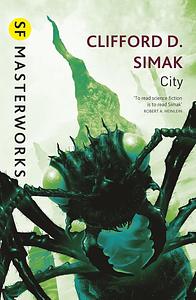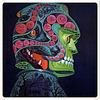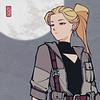You need to sign in or sign up before continuing.
Take a photo of a barcode or cover
Man's inhumanity to man (and beast)!
City is a masterpiece of creative genius crafted in Simak's trademark soft-spoken, pastoral style - a breath of fresh air contrasted against today's hard-boiled, fast-paced and typically cynical style of writing.
A series of loosely joined short stories is presented as the myths and legends that are told by dogs around their campfires to each other and their pups in a future so distant that no dog is actually certain that the creature Man ever really truly existed. From the standpoint of the reader, City represents a Michener or Rutherfurd style multi-generational family saga - a future history, in other words. Mankind, as represented by the Webster family and their robot, Jenkins, is seen as ascending to marvelous heights of technological achievement while evolving away from a traditional city style government, travelling to the stars and beyond, but ultimately descending into an agoraphobic, dystopian Spartan existence and disappearing into extinction. Jenkins - a ten thousand year old repository of flawless electronic memory and the only remaining human artifact - knows the true story of man's rise and fall but, acting in a fashion distinctly unlike anything Asimov might have attributed to a robot, keeps it to himself. Jenkins has concluded he owes canine society an opportunity to grow and flourish on its own unaware of the fact that dogs were once nothing more than pets to a mean-spirited and violent race of humans.
Although City contemplates a lonely ending to mankind as a species, hard core tech weenie sci-fi fans will rub their hands with glee as they read of Simak's imagination and prescience at work - automatic lawnmowers, atomic powered private planes, televisor ports, laboratories and manned bases on Venus, Jupiter and Pluto, an inter-stellar expedition to Alpha Centauri, the demise of natural farming fuelled in part by the rise of mass production hydroponics, ICBMs, inter-dimensional transportation, fireplaces reduced to an anachronistic self-indulgence, suspended animation called "The Sleep" as a psychologically gentler form of suicide, and, of course, thinking, sentient robots as servants and work mates.
To draw on a cosmological metaphor, the ending for man that Simak tells of is not the violent, catastrophic big crunch type ending that would see us wiped out in a blaze of glory. He rather talks of a much bleaker, almost unbearably sad ending to humanity as it simply disappears - the infinite boredom of heat death, as it were, as all motion ends and the universe reaches a boundless uniformity with the maximization of entropy. Simak is blistering in his criticism of man's arrogant opinion of his own place in the world, a theme he will return to again and again in such novels as Time is the Simplest Thing and Time and Again:
"But man had changed. He had lost the old knowledge and old skills. His mind had become a flaccid thing. He lived from one day to the next without any shining goal. But he still kept the old vices - the vices that had become virtues from his own viewpoint and raised him by his own bootstraps. He kept the unwavering belief that his was the only kind, the only life that mattered - the smug egoism that made him the self-appointed lord of all creation."
At once inspiring, frightening, un-nerving, depressing and yet touching, City is a classic that needs to be read by all true sci-fi fans.
Paul Weiss
City is a masterpiece of creative genius crafted in Simak's trademark soft-spoken, pastoral style - a breath of fresh air contrasted against today's hard-boiled, fast-paced and typically cynical style of writing.
A series of loosely joined short stories is presented as the myths and legends that are told by dogs around their campfires to each other and their pups in a future so distant that no dog is actually certain that the creature Man ever really truly existed. From the standpoint of the reader, City represents a Michener or Rutherfurd style multi-generational family saga - a future history, in other words. Mankind, as represented by the Webster family and their robot, Jenkins, is seen as ascending to marvelous heights of technological achievement while evolving away from a traditional city style government, travelling to the stars and beyond, but ultimately descending into an agoraphobic, dystopian Spartan existence and disappearing into extinction. Jenkins - a ten thousand year old repository of flawless electronic memory and the only remaining human artifact - knows the true story of man's rise and fall but, acting in a fashion distinctly unlike anything Asimov might have attributed to a robot, keeps it to himself. Jenkins has concluded he owes canine society an opportunity to grow and flourish on its own unaware of the fact that dogs were once nothing more than pets to a mean-spirited and violent race of humans.
Although City contemplates a lonely ending to mankind as a species, hard core tech weenie sci-fi fans will rub their hands with glee as they read of Simak's imagination and prescience at work - automatic lawnmowers, atomic powered private planes, televisor ports, laboratories and manned bases on Venus, Jupiter and Pluto, an inter-stellar expedition to Alpha Centauri, the demise of natural farming fuelled in part by the rise of mass production hydroponics, ICBMs, inter-dimensional transportation, fireplaces reduced to an anachronistic self-indulgence, suspended animation called "The Sleep" as a psychologically gentler form of suicide, and, of course, thinking, sentient robots as servants and work mates.
To draw on a cosmological metaphor, the ending for man that Simak tells of is not the violent, catastrophic big crunch type ending that would see us wiped out in a blaze of glory. He rather talks of a much bleaker, almost unbearably sad ending to humanity as it simply disappears - the infinite boredom of heat death, as it were, as all motion ends and the universe reaches a boundless uniformity with the maximization of entropy. Simak is blistering in his criticism of man's arrogant opinion of his own place in the world, a theme he will return to again and again in such novels as Time is the Simplest Thing and Time and Again:
"But man had changed. He had lost the old knowledge and old skills. His mind had become a flaccid thing. He lived from one day to the next without any shining goal. But he still kept the old vices - the vices that had become virtues from his own viewpoint and raised him by his own bootstraps. He kept the unwavering belief that his was the only kind, the only life that mattered - the smug egoism that made him the self-appointed lord of all creation."
At once inspiring, frightening, un-nerving, depressing and yet touching, City is a classic that needs to be read by all true sci-fi fans.
Paul Weiss
The Weirdest Aspect:
Written some 70 years ago but projecting a future thousands of year out makes for a completely surreal feeling. I mean it is about a future dogs society talking about ancient humans so yeah every page is strange. What does it say about our world?
Maybe I am bias because of my animal rights beliefs, and my love for dogs but I always found this an interesting exploration of the problems with the human race. I would love to do/read a modern adaptation of this novel in a Graphic novel or film but it is not likely to happen. What is a City? What is a War? How does Jenkins explain such things to Doggish culture? He tries and it says a lot of things about our world, mostly about how we gather as a society and how conflict threatens to destroy us. Bottom line is it good?
Amazing. This novel is very dated but considering the bulk of it was written in the 40's it holds up very well. Serious golden age science fiction that is not for everyone.
Clifford Simak was first suggested to me by Belgian Waffles (Experimental noise band from my home town Blomington Indiana) Bassist Matthew Whittaker in the early 90's. I went straight to Caveat Emptor a used book store in town and bought the time travel adventure Time and Again. I have been a fan ever since. Simak lived in Rural minnesota until his death in 1988. While City is considered his masterpiece other highlights include Cemetery World, Way Station, Ring Around The Sun and Choice of the Gods. All worth reading.
Written some 70 years ago but projecting a future thousands of year out makes for a completely surreal feeling. I mean it is about a future dogs society talking about ancient humans so yeah every page is strange. What does it say about our world?
Maybe I am bias because of my animal rights beliefs, and my love for dogs but I always found this an interesting exploration of the problems with the human race. I would love to do/read a modern adaptation of this novel in a Graphic novel or film but it is not likely to happen. What is a City? What is a War? How does Jenkins explain such things to Doggish culture? He tries and it says a lot of things about our world, mostly about how we gather as a society and how conflict threatens to destroy us. Bottom line is it good?
Amazing. This novel is very dated but considering the bulk of it was written in the 40's it holds up very well. Serious golden age science fiction that is not for everyone.
Clifford Simak was first suggested to me by Belgian Waffles (Experimental noise band from my home town Blomington Indiana) Bassist Matthew Whittaker in the early 90's. I went straight to Caveat Emptor a used book store in town and bought the time travel adventure Time and Again. I have been a fan ever since. Simak lived in Rural minnesota until his death in 1988. While City is considered his masterpiece other highlights include Cemetery World, Way Station, Ring Around The Sun and Choice of the Gods. All worth reading.
challenging
reflective
sad
medium-paced
Plot or Character Driven:
Character
Strong character development:
Complicated
Loveable characters:
Yes
Diverse cast of characters:
Yes
Flaws of characters a main focus:
No
adventurous
challenging
emotional
hopeful
fast-paced
Plot or Character Driven:
A mix
Strong character development:
Yes
Loveable characters:
Yes
Diverse cast of characters:
Yes
Flaws of characters a main focus:
No
Les chiens écoutent de bien étranges contes autour du feu, le soir, contes relatant l'existence d'"hommes" - ont-ils vraiment existé? N'est-ce pas plutôt un mythe fondateur?
J'ai adoré la construction de ce livre, l'approche presque mythologique donnée aux histoires, qui donne un côté très mystérieux et donne surtout envie de continuer pour connaître le fin de mot de l'histoire! Le découpage participe totalement à cette approche : des contes sur l'homme, introduites par des explications historiques pour le lecteur du futur, c'est très intéressant et ingénieux, ça plonge directement le lecteur dans ce qui va forcément, à un moment ou à un autre arriver - on pourrait craindre, dit comme ça, que l'histoire est révélée dès l'intro, mais pas du tout, ça introduit intelligemment, sans en dire trop, juste pour donner envie.
Le tout est traversé de pistes de réflexion sur ce que sont la civilisation, l'humanité, la vie en société, sans tomber dans le lourdingue, juste des descriptions laissant libre cours à l'interprétation...
Une belle découverte...
Pour compenser, je tiens à reprendre ici l'avis de gadl, d'historique mémoire:
À vous de juger...
J'ai adoré la construction de ce livre, l'approche presque mythologique donnée aux histoires, qui donne un côté très mystérieux et donne surtout envie de continuer pour connaître le fin de mot de l'histoire! Le découpage participe totalement à cette approche : des contes sur l'homme, introduites par des explications historiques pour le lecteur du futur, c'est très intéressant et ingénieux, ça plonge directement le lecteur dans ce qui va forcément, à un moment ou à un autre arriver - on pourrait craindre, dit comme ça, que l'histoire est révélée dès l'intro, mais pas du tout, ça introduit intelligemment, sans en dire trop, juste pour donner envie.
Le tout est traversé de pistes de réflexion sur ce que sont la civilisation, l'humanité, la vie en société, sans tomber dans le lourdingue, juste des descriptions laissant libre cours à l'interprétation...
Une belle découverte...
Pour compenser, je tiens à reprendre ici l'avis de gadl, d'historique mémoire:
Arrêtons les frais. Peut-être même la science-fiction. Ou bien trouvez-moi un vrai écrivain, avec des personnages qu'on sent vivre, et surtout de la science/technique crédible et détaillée : je veux avoir l'impression que l'auteur s'est documenté et que j'apprends quelque chose, même si c'est de la fiction.
Mon marque-page est à la page 93 depuis plusieurs semaines, et je n'ai pas l'intention de me forcer à atteindre la page 100 comme je fais d'habitude : j'ai trouvé d'autres lectures plus intéressantes entre temps.
À vous de juger...
hopeful
reflective
sad
medium-paced
Plot or Character Driven:
A mix
Strong character development:
Complicated
Loveable characters:
Yes
Diverse cast of characters:
Yes
Flaws of characters a main focus:
Complicated
medium-paced
Strong character development:
No
Loveable characters:
No
Diverse cast of characters:
No
challenging
dark
emotional
medium-paced
adventurous
challenging
dark
slow-paced
Plot or Character Driven:
Plot
Strong character development:
No
Loveable characters:
No
Diverse cast of characters:
No
Flaws of characters a main focus:
Yes
City follows the slow decline of human society and innovation, mostly through the lens of a specific family and their creations. Simak clearly holds little hope for the human race and it's ability to solve it's own problems. While the book is written in a tender and soft-spoken way, humanity is seen to fail again and again to revolutionize themselves, and become something greater. When given the opportunity, most humans choose to either run away from their problems, or simply ignore them. Yet, we see that some human are capable of great acts of sacrifice, in order to give other species a better chance at success. In humanities wake, other sentient races are born, in the hopes that they may one day exceed the legacy of their fore-bearers.
I loved the way that this 'fix-up' novel was tied together. It was humorous and added to the world building in a significant way. The ideas in City are pretty wild and fabulous. I was taken in by the child-like imagining of the world. If you're looking for hard sci-fi, I would suggest to look elsewhere. While this book has a lot to say on a philosophical stand point, it's also fun and whacky.
I will say that at some points you can really feel the age of the novel. It's as if women were but a distant memory in this world, as they have no role in the story. Characters are also thin, which is honestly to be expected. The chapters were very uneven in quality. Some were amazing. Some were especially slow-paced and pondering.
Ultimately, it feels like a very old book with very old ideas, but one that I can't help but love.
I loved the way that this 'fix-up' novel was tied together. It was humorous and added to the world building in a significant way. The ideas in City are pretty wild and fabulous. I was taken in by the child-like imagining of the world. If you're looking for hard sci-fi, I would suggest to look elsewhere. While this book has a lot to say on a philosophical stand point, it's also fun and whacky.
I will say that at some points you can really feel the age of the novel. It's as if women were but a distant memory in this world, as they have no role in the story. Characters are also thin, which is honestly to be expected. The chapters were very uneven in quality. Some were amazing. Some were especially slow-paced and pondering.
Ultimately, it feels like a very old book with very old ideas, but one that I can't help but love.
Досить дивний твір.
Все починається як наукова фантастика, а закінчується як майже фентезі. Фентезі, тільки з роботами. Такого я зовсім не очікувала.
Не те, щоб ця «зміна жанру» зовсім щось зіпсувала, вона була введена дуже плавно і виправдано. Проте, мені наче хотілось чогось трохи іншого, більш справжнього.
Але, вцілому, книжка досить цікава, усі оповідання пов´язані сюжетом та персонажами, і хочеться дізнатися, чим усе скінчиться.
Все починається як наукова фантастика, а закінчується як майже фентезі. Фентезі, тільки з роботами. Такого я зовсім не очікувала.
Не те, щоб ця «зміна жанру» зовсім щось зіпсувала, вона була введена дуже плавно і виправдано. Проте, мені наче хотілось чогось трохи іншого, більш справжнього.
Але, вцілому, книжка досить цікава, усі оповідання пов´язані сюжетом та персонажами, і хочеться дізнатися, чим усе скінчиться.








